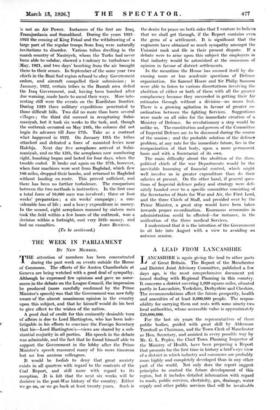THE WEEK 4-N PARLIAMENT
BY NEW MEMBER.
THE attention of members has been concentrated during the past week on events outside the House of Commons. The -efforts -of Sir Austen Chaniberlain at Geneva are being watched with -a good deal of sympathy. Although he -expressed few opinions and gave no assur- ances in the dehate on -the-League Council, the impression he produced (more carefully confirmed by the Prime Minister's speech) was that the -Government was now fully aware :of the .,almost unanimous opinion in the country upon this subject, and that he himself would do his best to -give effect to the wishes of the -nation.
A good deal of credit for this eminently -desirable turn of affairs is due to Lord Harting,ton, who has been inde- fatigable in his efforts to convince the Foreign Secretary that his—Lord Hartington's—views are shared by a sub- stantial majority in all parties. His speech in the debate was admirable, and the -fact that he found himself able to support -the Government in the lobby after the Prime Minister's speech reassured many of his more timorous but no less anxious colleagues.
It would be foolish to deny that great anxiety exists in all quarters with regard to the contents of the Coal Report, and still more with regard to its reception. It is felt that the next six weeks will be decisive in the post-War history of the country. Either we go on, -or we go back at least twenty years. Such .is the desire for peace on both sides that I venture to believe that we shall get through, if the Report contains even the germ of a settlement. It is significant that the engineers have obtained so much sympathy amongst the Unionist rank and -file in their present dispute. If a debate were to arise upon this subject the employers in that industry would be astonished at the consensus of opinion in favour of district settlements.
In the meantime the House has amused itself by dis- cussing more or less academic questions of Defence organization. Sir -Samuel Hoare and Sir Philip Sassoon were able to listen to various dissertations involving the abolition of either or both of them with all the greater complacency because they succeeded in getting their Air estimates through without a division—no mean feat. There is a growing agitation in favour of greater co- ordination between the fighting Services. Suggestions were made on all -sides for the immediate creation of a Ministry of Defence. So revolutionary a step would be unlike us. The constitution and powers of the Committee of Imperial Defence are to be discussed during the course of the session ; and the probable solution of the defence problem, at any rate for the immediate future, lies in the reorganization of that body, upon a more permanent basis and with a Secretariat of its own.
The main difficulty about the abolition of the three political chiefs of the war Departments would be the inevitable loosening of financial control, which might well involve us in greater -expenditure than do their salaries at present. On the other hand, if general ques- tions of Imperial defence policy and strategy were defi- nitely handed over to a specific committee consisting of the Secretaries of State for War and Air, the First Lord, and the three Chiefs of Staff, and presided over by the Prime Minister, a great step would have been taken towards proper co-ordination. Enormous economics in administration could •be effected—for instance, in the unification of the three medical Services.
I understand that it is the intention of the Government to sit late into August with a view to avoiding an autumn session.






























































 Previous page
Previous page